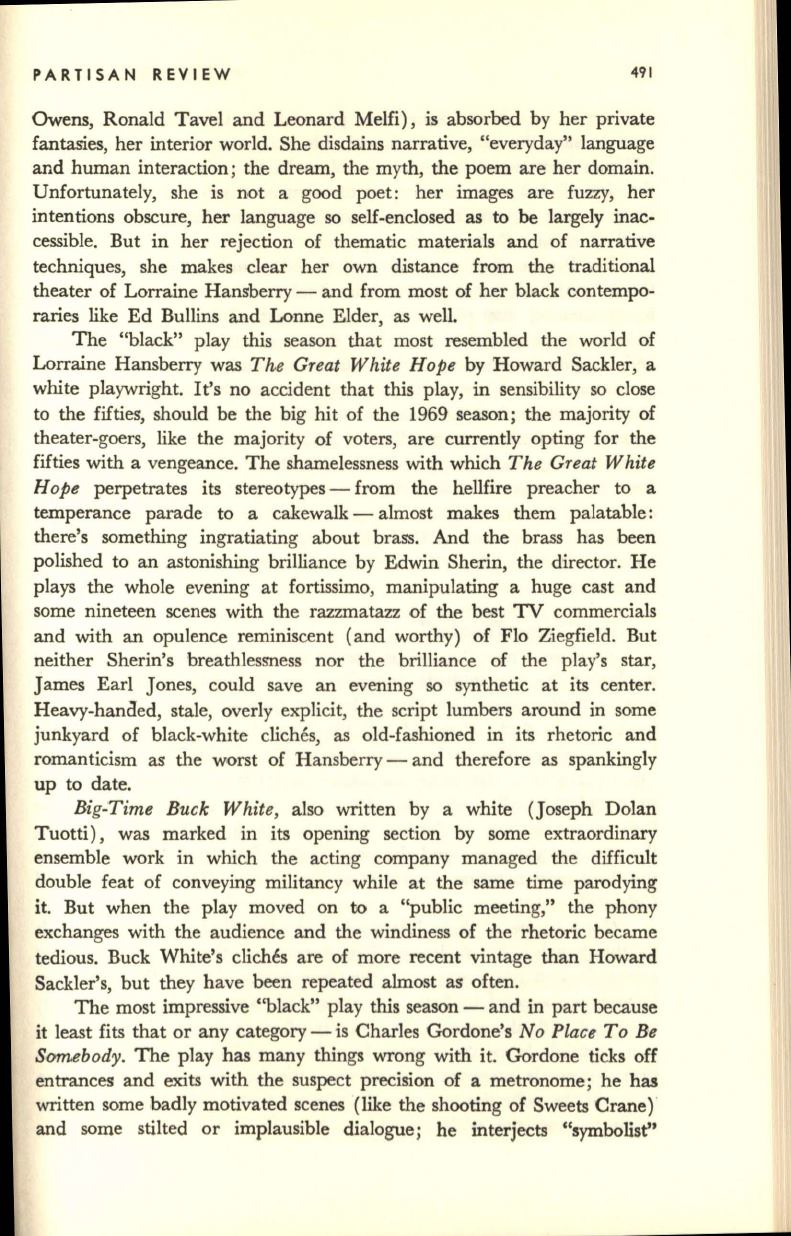
PARTISAN REVIEW
491
Owens, Ronald Tavel and Leonard Melfi), is absorbed by her private
fantasies, her interior world. She disdains narrative, "everyday" language
and human interaction; the dream, the myth, the poem are her domain.
Unfortunately, she is not a good poet: her images are fuzzy, her
intentions obscure, her language so self-enclosed as to
be
largely inac–
cessible. But in her rejection of thematic materials and of narrative
techniques, she makes clear her own distance from the traditional
theater of Lorraine Hansberry - and from most of her black contempo–
raries like Ed Bullins and Lonne Elder, as well.
The "black" play this season that most resembled the world of
Lorraine Hansberry was
The Great White Hope
by Howard Sackler, a
white playwright. It's no accident that this play,
in
sensibility so close
to the fifties, should be the big hit of the 1969 season; the majority of
theater-goers, like the majority of voters, are currently opting for the
fifties with a vengeance. The shamelessness with which
The Great White
Hope
perpetrates its stereotypes - from the hellfire preacher to a
temperance parade to a cakewalk - almost makes them palatable:
there's something ingratiating about brass. And the brass has been
polished to an astonishing brilliance by Edwin Sherin, the director. He
plays the whole evening at fortissimo, manipulating a huge cast and
some nineteen scenes with the razzmatazz of the best TV commercials
and with an opulence reminiscent (and worthy) of Flo Ziegfield. But
neither Sherin's breathlessness nor the brilliance of the play's star,
James Earl Jones, could save an evening so synthetic at its center.
Heavy-handed, stale, overly explicit, the script lumbers around in some
junkyard of black-white cliches, as old-fashioned in its rhetoric and
romanticism as the worst of Hansberry - and therefore as spankingly
up to date.
Big-Time Buck White,
also written by a white (Joseph Dolan
Tuotti), was marked in its opening section by some extraordinary
ensemble work in which the acting company managed the difficult
double feat of conveying militancy while at the same time parodying
it. But when the play moved on
to
a "public meeting," the phony
exchanges with the audience and the windiness of the rhetoric became
tedious. Buck White's cliches are of more recent vintage than Howard
Sackler's, but they have been repeated almost as often.
The most impressive "black" play this season - and in part because
it least fits that or any category-is Charles Gordone's
No Place To Be
Somebody.
The play has many things wrong with it. Gordone ticks off
entrances and exits with the suspect precision of a metronome; he has
written some badly motivated scenes (like the shooting of Sweets Crane),
and some stilted or implausible dialogue; he interjects "symbolist"


